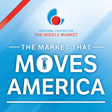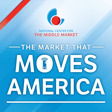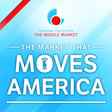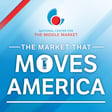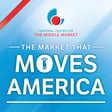Become a Creator today!Start creating today - Share your story with the world!
Start for free
00:00:00
00:00:01

Building an AI Ready Workplace
In this episode, we dive into the transformative power of AI in the modern workplace with Stephanie Donahue, Practice Leader at Avanade. As tools like Microsoft 365 Copilot and agent-based systems gain momentum, the pressure is mounting for middle market companies to modernize responsibly. Stephanie unpacks how businesses can build a strong digital foundation, shift organizational culture, and empower employees through intentional change enablement. With real-world insights and a future-focused lens, she explores what it means to prepare for a hybrid workforce of humans and intelligent agents.
Transcript
Maximizing AI in Middle Market Companies
00:00:00
Speaker
Artificial intelligence is becoming more prevalent across businesses of all sizes, but how can middle market companies take advantage of these tools and what considerations must they make when deciding on how, where, and when?
00:00:13
Speaker
Today, we talk with an expert specializing in technology implementation with advice on how to think about an approach to effectively using ai
00:00:23
Speaker
Welcome to the Market That Moves America, a podcast from the National Center for the Middle Market. The center is the leading source of knowledge, leadership and innovative research on the middle market economy. Throughout our podcast, we will feature middle market leaders and stakeholders to hear their real world perspectives on trends and emerging issues.
00:00:46
Speaker
Welcome to the market that moves America.
The Rise of AI in Business
00:00:48
Speaker
My name is Doug Farron, Managing Director of the National Center for the Middle Market, located at The Ohio State University Fisher College of Business. Well, in the last two years, there hasn't been a topic that's become more more of a hot issue for really all of business, but particularly for middle market companies than the idea of artificial intelligence, AI.
00:01:14
Speaker
ah The center started tracking this issue a couple of years ago through our middle market indicator, and we've seen a very slow but but consistent increase in the amount of mid-sized companies that are both implementing AI in their companies as well as experimenting and testing and just really trying to understand where it fits best for them.
00:01:37
Speaker
In
Meet Stephanie Donahue from Avanade
00:01:38
Speaker
our podcast episode today, I will be talking with an expert, ah Stephanie Donahue from Avanade, who works on basically working with companies on IT t consulting, workplace modernization and so forth. So we'll we'll learn a lot more about that.
00:02:00
Speaker
But first, I'd like to welcome Stephanie to the to the podcast. Thanks for having me. Excited to be here. Great. um Well, Stephanie, could you start with just telling us a little bit about your background, your role today, kind of where you focus, and then maybe a little bit of of background about Avanade too?
00:02:19
Speaker
Sure. um So I'm the practice leader of our Modern Workplace team in the US s at Avanade. And if you're not familiar with who we are, Avanade is a joint venture company between Microsoft and Accenture. So we're solely focused on Microsoft-based consulting services.
00:02:36
Speaker
And, um you know, I think, you know, Accenture is pretty well known for working with large enterprise. And so Avanade's kind of fallen along behind that traditionally. But we actually do work with the mid-market now. So um that's a space that that we're getting super comfortable in.
00:02:53
Speaker
um you Traditionally in modern workplace, if we dig into that another layer, you know we've we've thought about our work in in terms of tools.
Modern Workplace and Hybrid Work
00:03:00
Speaker
um Microsoft 365 administrators, Teams and SharePoint collaboration, forms and workflows, power platform, migration, identity work, that sort of thing.
00:03:11
Speaker
um But now you know we're working with M365 Co-Pilot, Agentec AI, as you mentioned, all the rage, all the hot topic. That's all come into the picture now. So we also have a big focus on helping organizations transform culture, process at work.
00:03:28
Speaker
um We often think of M365 Co-Pilot for personal productivity, but also you know now it's about changing the way people work together as a team, as an organization, and and completely rethinking relationships. business process as we move kind of into this agentic world.
00:03:43
Speaker
um So that's that's a little bit about Avanade and what we do. um I can tell you personally, um my responsibilities include anything from people leadership to our go-to-market strategy, learning and development strategies. I'm sure you can imagine that's a big uplift right now, um keeping keeping the whole team on the edge with AI and agents and you know endpoint modernization and things like that.
00:04:08
Speaker
um It's our job to stay on the bleeding edge. so but But I'm also very hands-on with customers. especially their leadership teams as well. And yeah, I have a degree in computer science um from the Ohio State University. So I've been in IT for 26 years now, 15 of that in the mid-market.
00:04:26
Speaker
And eight years I ran my own consulting business, Microsoft consulting business before coming to Avanade. So I probably spent the last Decade is a solution architect helping organizations modernize their digital workplace.
00:04:38
Speaker
um Microsoft MVP, regional director, um you know, of just using every ounce of everything I've learned in the past to lead Avanade and our customers into the future of work.
00:04:50
Speaker
Yeah, that's great. um can you So workplace modernization, you kind of touched on it a little bit, but could you tell me a little bit more? Because I heard words like culture, yeah hybrid workplace. So much has changed in the last four or five years. and I'm sure you're seeing this across all of your clients. But Talk to us a little bit more about what that means and like how do you dig in with with these customers and really kind of tie all those pieces together? Because that can be a huge challenge, particularly for midsize companies.
00:05:22
Speaker
Yeah, and what's interesting is the definitions changed quite a bit just in recent days, right? When you say hybrid work, um you know, when we were back in the COVID timeframe, hybrid work meant maybe partially work from home, right? That's kind of where that got started, but also now working working in the office a little bit.
00:05:39
Speaker
um and And that's kind of what we've known to be hybrid. And what we're hearing from Microsoft now, they talk about this concept of being a frontier firm. And what that means is that we could have agent workforces. And that means that agents could be also teammates of ours. And so they're now part of that workforce and hybrid could actually mean human and agentic employees, which is a really interesting concept, right? um But that's ah
Aligning AI with Work Culture
00:06:05
Speaker
that's a huge transformation. It's a big jump from where we are today. And I think a lot for people to get their arms around.
00:06:11
Speaker
And that's why that culture... piece of it is so important because we look at what we know work to be today and what our culture is today. and that's a lot different. So this becomes not just about deploying a new product or deploying ai tools, but really figuring out how to align them with how people work. and you know, that starting place needs to be just learning the foundational stuff, right? We don't need to jump into hybrid teams with agents.
00:06:39
Speaker
We just need to be, you know, learning about them, what is responsible AI, right? Not using personal chat GPT to enter your work data and and your organization's intellectual property, right?
00:06:53
Speaker
um Things like having a strong digital core and making sure that customers are, you know, our our organizations are doing due diligence on data governance, not oversharing from OneDrive, right? So,
00:07:05
Speaker
Starting from from those small, what I call like baby steps, right? On on just learning about AI, learning to be responsible and and being careful with our data. um and And then kind of bringing that all around to what's the employee experience going to be with AI? And, and you know, we always say there's shadow AI, right? So if you don't start looking at this as an organization, your employees are going to start to use it on the side anyway.
AI Adoption in Conservative Industries
00:07:33
Speaker
And and wouldn't you rather...
00:07:35
Speaker
be, you know, from a foundational level, putting those things in front of them so they can be responsible with them. In your experience, Stephanie, do you find that there are certain types of organizations or maybe it's certain industries where that um that mindset is a little bit more prevalent it and it helps accelerate the change in the learning? Because i I can think of examples where there might be more resistance to maybe technological change and maybe other organizations where it's like, hey, this is just how we do things and we're more open to to continual learning and those those type of things. I'd be curious to hear your experience.
00:08:12
Speaker
And it it kind of makes me laugh a little bit to answer this question, because i would have told you the opposite a few years ago. um Because when it comes to our regulated industries, you know, um we look at healthcare, care finance, right?
00:08:28
Speaker
we've We've had all these compliance and regulations to deal with, right? You have HIPAA on the healthcare care side and um you know, FINRA for finance. And they've traditionally been very conservative with bringing on new technology because they have all of these checks and balances, right? They they have to go through and make sure they're meeting policy.
00:08:47
Speaker
But what's interesting about AI and and specifically, you know, I work a lot with M365 co-pilot is that it's actually been those industries that are leading the charge into ai And it's simply because their data is ready.
00:09:00
Speaker
It's organized, it's protected, it's labeled, right? they They've already had to go through all those checks and balances to make sure the data is ready. And this is just the layer on top of that that data um that that makes it easier to access that data. So so it's almost been a flip. and And we see those regulated industries pushing forward in a way that some of the others are struggling
Strategies for AI and Tech Investments
00:09:22
Speaker
because they've done they've done that foundational work up front.
00:09:25
Speaker
Right. That makes, yeah, that does make sense now that you explain that that way. um We recently did a case study about a middle market company. They're actually a, a technology implementation partner, and they themselves, they actually experimented over the last 18 months with Copilot and then kind of took those internal learnings um to to become a better partner for their clients. ah And then generally, we've seen many instances where middle market companies particularly try to make the most out of these types of investments. So what would be
00:09:59
Speaker
kind of your point of view on how, particularly in the middle market, you know, technology, whether it's AI or something else, how those and how can those investments be maximized? Mm-hmm.
00:10:11
Speaker
and you know this this answer is probably the same regardless of the size of the organization, but the timeframes might be different. um you know With a really large organization, you have a lot of people you can throw at a project, right? And at the mid-market, you probably have a person or two who's kind of a jack of all trades, right? They do a lot of different things. They have a lot of responsibilities. And so the timeframes for some of these things may be different as a smaller organization.
00:10:37
Speaker
But at the foundation, we ah we always start with a strategic assessment. And that can be done with a partner or just internally. You just sit down and say, where is our business today and where do we want to go?
00:10:50
Speaker
And, you know, if if ah going back to that strong digital core conversation we just had, right, if you want to integrate AI, but that strong digital core is not there Let's not jump into AI too quickly. Let's go back and make sure that our data is protected, right? That we don't have those oversharing problems in OneDrive.
00:11:08
Speaker
um But we may also be looking at things like, where is that data? Do we still have on-premises systems, right? That's not accessible to most ai in general, right? It's going to have to be cloud-based.
00:11:19
Speaker
Right. So you really kind of have to sit down and say, are we already in the cloud? Is our data protected in the cloud? And then from there, once you kind of have those foundational items set, then you can start aligning to things like,
00:11:33
Speaker
what measurable outcomes do we want to have? Because you'll see people on two sides of the fence. Some organizations will want to have a strong ROI. They want to see that return on investment and that's what's driving them. They want to see bottom line, they want to see the dollars come in, right? And and sometimes that might mean um full-time employee reduction, right? That's a pretty big conversation.
00:11:56
Speaker
But on the other side of the fence, we have organizations that won't even go there. We're not talking about eliminating employees for this We're focused on the employee experience. We want them to get more out of their day. We want them focusing on the things that are important, that they're good at, right? You have really talented engineers who are doing manual processes. We want to make them more efficient so they can do the things that we need them to do with their engineering expertise, right? So we're going to refocus them. So you really have to kind of understand who you are as an organization,
00:12:30
Speaker
where you're at foundationally from a tech perspective, and then what do we want to get out of it? What's the um most important thing? And all of those things are going to help you drive what is that conversation that we need to be having? How fast do we need to move through this?
00:12:43
Speaker
And what types of use cases should we be looking for? um and those are all things that you can do um to to really kind of expedite that um experience and make sure that you're going to get the most out of out
Change Management in AI Adoption
00:12:55
Speaker
of your AI implementation.
00:12:56
Speaker
Yeah, that's that's a great segue to my next question for you, which was just beyond the tools themselves. You were starting to describe really the people aspect of this, that kind of the change management that goes along with it. I mean, it sounds like it's very much a unique thing.
00:13:13
Speaker
situation from company to company, depending on some of those factors that you were talking about. But yes what are some of the things that you know companies can think about when it comes to making sure that their employees are comfortable with this, that they feel fully empowered to use the tools to their maximum efficiency? Because like you said, you don't want to, I mean, they're probably going to do it off to the side anyway. They might be using it in their personal life, but now we're talking about integrating it into the workplace.
00:13:40
Speaker
Yeah. Yeah. And it's the most important thing that I think we need to emphasize is that it's more than just training, right? This is about building confidence and trust in the tool, in AI.
00:13:52
Speaker
And that doesn't happen overnight. And i often liken this to exercise. Right. We think about i want to start a new exercise plan. And when you start exercising, you know, going to get on the treadmill, you're going to start lifting. um And then you get on the scale the next day and you're like, I haven't lost any weight or I'm not more muscular. Right. You're like, why not?
00:14:11
Speaker
um Because it's only been 24 hours. Your expectations may be too high. um But when you integrate it in a daily basis, it's something you're intentional about. You make the time to go work out every single day.
00:14:24
Speaker
um You add in things like eating healthy, right? And then you look back and in three months, you can see the progress, right? You can see how it's been intentionally worked in and that you're gaining results.
00:14:35
Speaker
And I very much look at ai the same way. This is not going to be overnight. We're talking about huge business transformational change, right? That is not something you're just gonna implement this, do a single training session and see massive results, right? You've gotta come back in and say, okay, we need change enablement, not training.
00:14:53
Speaker
And the employee experience is based on how successful that enablement program is. So we look at things like office hours, holding prompt-a-thons where they you know have intentional time to think about what problems are we trying to solve and how might we use AI to do that, right?
00:15:11
Speaker
Having a space like something like Viva Engage or Teams where they can connect with each other and help each other and they're not just waiting on IT t support, right? How can they connect and share stories and ideas?
00:15:23
Speaker
um Having a center of excellence, you know, things like that, where they have a place to go for, what am I allowed to do What am I not allowed to do? How do i get more training? you know, those sorts of things. um So all of those kind of combined make up that change enablement program. And those are the things that are going to help you truly drive adoption in a way that just dropping someone into a training program is not.
00:15:46
Speaker
And again, it takes time. um i can't There's an article that talks about it's like 11 by 11, and it actually takes up to 11 weeks for an end user, um an employee to start really gaining the value from a tool like Microsoft 365 Copilot.
00:16:04
Speaker
um Because again, you're coming in and you're saying, how do I work differently today? and that takes practice and habits because If I come in every morning and I'm manually scanning my emails to figure out what am I going to work on today, i should instead go to Copilot and say, what are the most important things in my inbox that I need to address?
00:16:23
Speaker
Very different mindset. You know, we have people tell us they even put like sticky notes on their monitor, like remember to use Copilot, which is right. That's funny, but it's true, right? It just takes, it takes that daily practice. It takes intentionality and it takes change enablement programs over training, um which is just very different.
00:16:41
Speaker
um than what we see traditionally with an IT t rollout for a new product. And I believe there are communities out there, right? Where you can reach out to other users and ask questions. I mean, to your point, like some of the IT departments may may be very resource constrained and they don't have time to answer every single question that's out there, but you can oftentimes learn from peers who are kind of tackling some of the same issues or have a question about like, hey, how did you best go about doing X, Y, and Z? Have you seen a lot of that too?
00:17:13
Speaker
Oh, absolutely. And, you know, I'd say if you're M365 co-pilot, you could look at like Microsoft Tech Community would be one. um That would be a place you can go. It's like forum based, basically, where you can post a question and get answers.
00:17:27
Speaker
And that's a whole community that can answer. You're not waiting on Microsoft there. It just happens to be Microsoft hosted, um you know, and then there's. you know I've seen things on Reddit. um I've seen things on their Facebook groups, right? there's There's all kinds of stuff. If you just go search the web, um maybe you could ask Copilot, right? That's actually one of the best tricks you can do ask chat GPT or ask co-pilot, like help me make this prompt better. Or what kind of prompt would I need in order to do X, Y, Z? And it'll give it to you. It's the best training tool you've ever had in your life. Cause you don't have to go, you know, Google search, Bing search, whatever. um It's actually going to bring you the answer back and then give you the references. um So definitely use your AI to learn more about it.
00:18:11
Speaker
Yep.
Privacy and Security in AI Tools
00:18:12
Speaker
You mentioned um a little earlier privacy and security. So as we survey middle market companies regularly, you know some of the issues or challenges that they call out about AI ah Certainly like, hey, how do I implement it effectively? Where do I get started? Those types of things. But then very high on the list is they're concerned about privacy and security of data.
00:18:37
Speaker
So what are some of the recommendations you have to ensure that that is addressed and you know doesn't become a barrier necessarily to using all these great tools?
00:18:48
Speaker
Yeah. and And that's where using a trusted tool can be really helpful to the mid-market in comparison to, um you know, maybe creating your own. Because we do have a lot of ability now to create our own from scratch. You know, we can we can build everything custom if we want to.
00:19:06
Speaker
um But when when you use a trusted tool and, you know, clearly I have bias towards co-pilot since that's the space that I sit in. on then you know it comes, I say with an easy button, because in Microsoft's case, and I know this is the case in other enterprise tools as well,
00:19:24
Speaker
um The bias mitigation is built in The prompt and injection protection is built in, right? In Copilot's case, it's using all of the existing security permissions that you have in place for Teams and SharePoint. It's using the existing sensitivity labels. There's no additional work needed, right?
00:19:42
Speaker
So that's something that you can come in and and turn on and have those things already available to you. So so i definitely recommend looking at something like a trusted tool if you're a smaller organization And you don't have the people to build things from scratch and to do the testing and to build in the bias mitigation and and those sorts of things. Right. So, you know, we in the Microsoft space, we say that we have the policies available to create what I call a fenced in backyard.
00:20:10
Speaker
right Give them enough room to go and use Copilot, create agents, use the tools to be productive and not wait on it We don't want anybody running into the street. right And that's what those policies are there for. um You've got those safety mechanisms in place so that we don't have to worry. We know they're in a safe environment.
Future of AI in the Workplace
00:20:28
Speaker
And that, you know, it's it's going to be hard, pretty hard in order to to break that and and to do something that would get them in trouble. um so Microsoft has something called enterprise data protection.
00:20:39
Speaker
And what that means in short is that those foundational models aren't learning or improving from your organization's content. or your prompts, right? So even when you query the web, your data is protected. And and that's not always the case when you're creating things.
00:20:53
Speaker
um you know You have to be very careful. If you just plug things into the public chat GPT, it's learning from you. and And we need to remember that, right? So um there are definitely some easy buttons if you're looking to get started quickly where those safety mechanisms are already in place.
00:21:08
Speaker
Yeah. So as we kind of wrap up the discussion, and i mean, we could go on for hours. I mean this is i could talk for days. yeah this is so It's so interesting because it's just so applicable in real time. But Stephanie, if you were to think about, this is changing so rapidly, but do your best to think about what the next couple of years, like three to five years, where do you think this is going? What are going to be some of the like evolving trends or where where do you ah direct clients or, you know, companies you work with to start thinking about, okay, in 2030, here's where this is going to be. I mean, I know it's pretty difficult to try to predict, but if you, if you could, but what, what, where do you see the modern workplace heading?
00:21:54
Speaker
Yeah. Five years feels really far away right now, doesn't it? um you know and i When I think about our near future, it's really about building the foundation. And if I had one piece of advice, right, it's build your AI fluency now. So you're ready to scale responsibly as this technology matures.
00:22:14
Speaker
um and First and foremost, I think the right the now is that, you know, we have, agents and that that are able to do specialized tasks, right? They're pretty independent.
00:22:26
Speaker
They're probably not in connection with other agents yet, unless you're really on the bleeding edge. um you know You're just starting to embed these things into your daily workflows, lots of proof of concepts going on right now.
00:22:39
Speaker
But what's coming in in the near future is that we're going to see that transition to what we call multi-agentic systems, where you're going to have an agent that can call another agent to do a task for you, right? So let's say i'm going have one agent go and do the research, and then I'll have a secondary agent who would then write the report up for me based on the research that the first agent pulled up.
00:23:02
Speaker
So we're going to have this chain of agents that are able to first maybe be kind of a one-by-one workflow, and then maybe eventually they'll be able to be smart enough to call themselves based on what the need is.
00:23:15
Speaker
um and And that you know will come over time. I'm thinking that's probably you know a year year, and a half out where we'll see more commonly. And then you know two years plus maybe, that's really where we're gonna have that agentic web. We're gonna start seeing that shift into that frontier firm that I was referring to um where we start to see like everyone's an agent boss. Maybe I have a team of agents that I use every day to get specific tasks done And, um you know, I'm responsible for making sure that I'm the human in the loop for those agents, right?
00:23:50
Speaker
um and that they're all working together. And that's you know that's a couple years out. It's really hard to go ah couple you know further than that right now. Things are changing so incredibly fast.
00:24:03
Speaker
um I think it's hard to imagine beyond that. And maybe my timeframes are shortened, right? I think maybe a couple years out, having that kind of functionality really feels like a push yeah um because that that requires that that might be where the leading edge customers or the organizations are But I think over those next additional three years, that'll be when it it hits everyone else. It's going to take a while for people to get to that level of comfort and to be able to have the right technology um expertise in-house to be able to to move into that
Practical AI Applications
00:24:39
Speaker
space.
00:24:39
Speaker
Yeah, i don't know this I don't know if this was an example that you had shared or I'd heard in a different session, but i don't like a personal use case, if I were to have a scheduling agent who could then reach out to my doctor's office's agent and they would just book my next wellness check and it just gets on my calendar. Like those type of interactions seem to be ah like kind of the next wave.
00:25:03
Speaker
Yeah, and you know I keep joking that I'm going to create an agent. um And and i'm I'm half serious if I could find the time, but I i just want to be able to label, you know if it comes in from you know my direct manager or my skip level manager, that it's an automatic accept regardless of what's on my calendar, right?
00:25:20
Speaker
The second tier is like if it's a customer meeting, it'll you know it'll accept that and bump at a lower tier meeting and everything else that's internal is like that tier three. And that it'll make decisions on my meetings based on the tiering system and in my and my calendar. I don't know. That's my my dream world. My executive assistant agent.
00:25:40
Speaker
That's what I want to build.
Conclusion and Resources
00:25:41
Speaker
Absolutely. Well, um yeah, this has been really, really interesting and just love the conversation. so I appreciate your time, Stephanie. And thanks for for joining me today.
00:25:52
Speaker
Yeah, thanks for having me. This has been a good time. For more about Avanade, Stephanie's organization, you can visit their website, which is Avanade.com, and we will talk to you all soon. Thank you.
00:26:06
Speaker
Thank you for listening to The Market That Moves America. Never miss a new episode by subscribing anywhere podcasts can be found. You can also subscribe to our email newsletter at middlemarketcenter.org.



